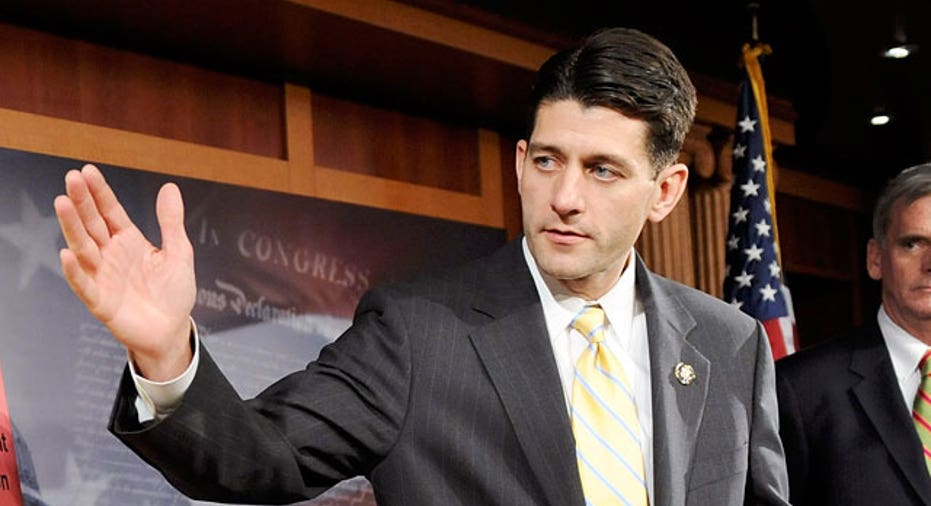Republicans Propose $6T in Spending Cuts

WASHINGTON – U.S. Republicans on Tuesday proposed $6 trillion in spending cuts over a decade, including a politically risky overhaul of government-run health programs, while also slashing tax rates as part of their 2012 budget blueprint.
The budget proposal comes as Congress and President Barack Obama are arguing over the 2011 budget -- six months into the fiscal year -- and trying to avoid a government shutdown Friday when money runs out.
The Republicans' 2012 plan, unveiled by House Budget Committee Chairman Paul Ryan, is sure to deepen a battle over government spending with Obama's Democrats as the two sides ramp up to the 2012 election season.
And like the 2011 spending-cut plan that Republicans rammed through the House of Representatives, Ryan's initiative attempts to kill off Obama's landmark healthcare reform law.
he Democratic-controlled Senate blocked the first attempt and is expected to do so again.
In trying to bring the world's largest economy back to a fiscally sustainable path after a decade of deficit spending, Republicans in the House are proposing an overhaul of two government programs, Medicare and Medicaid, that together account for about one-fourth of all federal spending by providing healthcare for the elderly and poor.
These two programs have served as pillars of the nation's social safety net since the 1960s.
While risking a political backlash from senior citizens, Republicans are hoping their plan will resonate with independent voters and Tea Party activists who have been railing about the rapidly escalating U.S. debt burden.
REPUBLICAN REBUTTAL
Ryan's proposal, a budget blueprint for the fiscal year that starts on Oct. 1, also serves as a conservative rebuttal to the activist government role Obama has pursued.
The Democratic president unleashed hundreds of billions of dollars in government stimulus to combat the deepest recession since the 1930s.
Under Ryan's plan, retirees who now qualify for Medicare would instead be given vouchers to buy coverage on the open market, in an effort to limit cost growth through competition.
State governors, many of them facing severe budget constraints, would be given wide discretion over how to administer the Medicaid health program for the poor.
Those changes would mean Medicare recipients would shoulder more costs themselves and fewer people would qualify for Medicaid, healthcare advocates say.
Top tax rates for individuals and businesses would fall to 25 percent from 35 percent.
The plan would cut government spending by $5.8 trillion over the next 10 years, nearly six times the cuts envisioned by Obama's own budget plan.
Budget deficits, which have hovered at about 10 percent of the economy in recent years, would be brought down to 2 percent of GDP by 2017. Economists consider deficits of around 3 percent of GDP to be sustainable.
Still, the Ryan plan would not lead to a balanced budget within 10 years -- a feature that could disappoint conservative Republicans who are working on their own budget plan, as well as fiscal hawks who have urged Washington to tackle comprehensive budget reforms before the country faces a Greece-style debt crisis.
Though it may pass the House, the plan is not likely get far in the Democratic-led Senate. Senate Budget Committee Chairman Kent Conrad has said any efforts to balance the budget will have to include increased tax revenues, not just spending cuts.
He and a bipartisan group of five other senators have been working on their own long-term salve for the economy. It's unclear when they will unveil their proposals, however.
Democrats have been criticizing Ryan's plan in the days before its release.
Still, it could serve as the start of a worthwhile discussion about how the country will meet the challenges of a growing debt burden and an aging population, said David Walker, a budget expert who has served as U.S. Comptroller General and head of the Government Accountability Office.
"My sense is his proposal will be a starting point, not an ending point because ultimately you have to do something that not only makes economic sense, is socially equitable and culturally acceptable, you have to do something that is politically feasible," Walker said in a telephone interview.



















